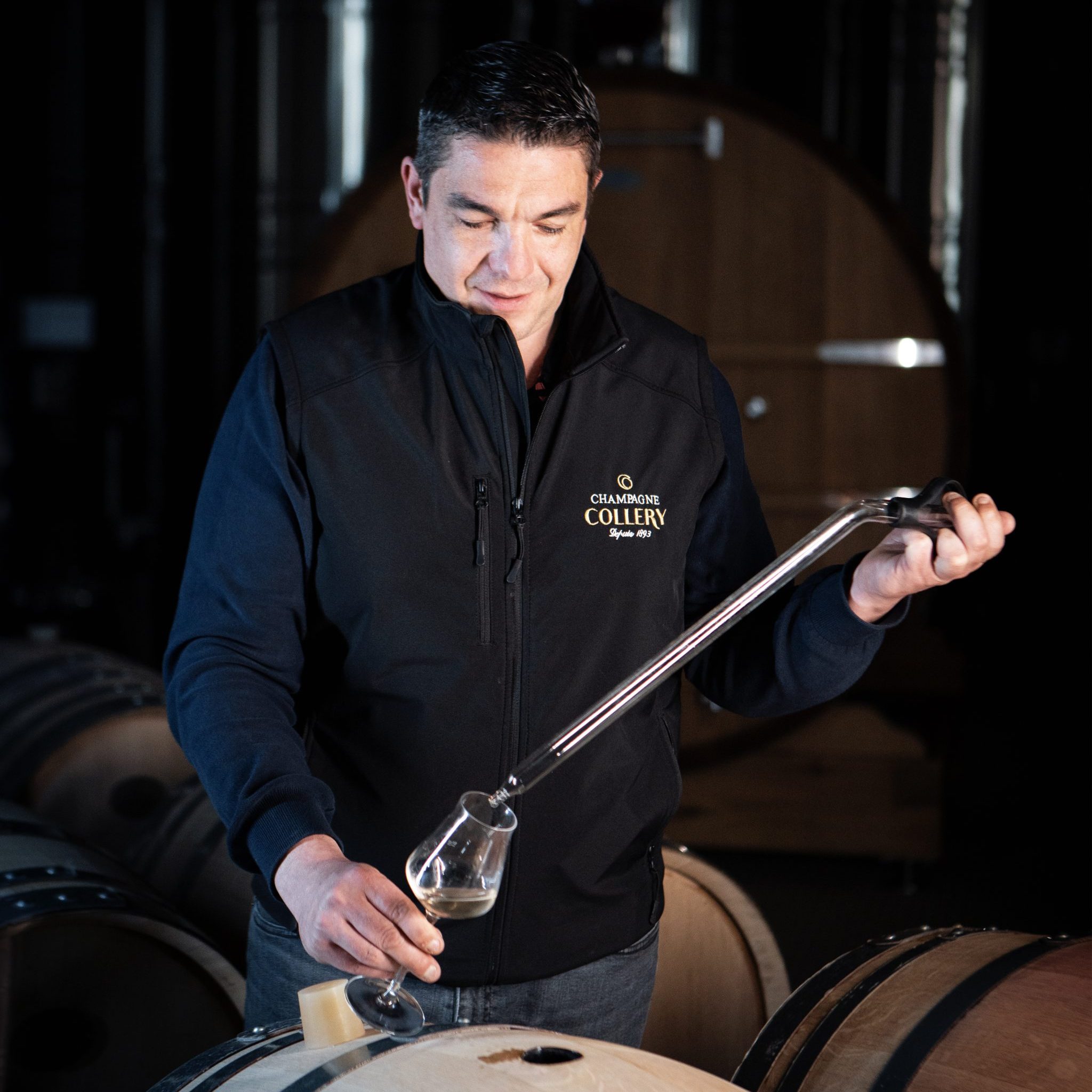‘Brexit isn’t a disease – it’s man flu’
By Lauren EadsBetween rising rents, increasing competition and the looming shadow of Brexit leaving a sour taste in the mouths of a European workforce, the past year has not been easy for London restaurateurs, but Brexit isn’t all to blame for a growing staff shortage, as a recent Wine List Confidential masterclass revealed.
(L-R) WLC chief reviewer and content editor Douglas Blyde; Clement Robert MS, beverage director at Texture; Roger Jones, chef patron at the Michelin-starred The Harrow at Little Bedwyn; and Jan Konetzki, wine director at Ten Trinity Square Private Club
Dozens of restaurants have already closed their doors in the face of such challenges, with a string of Jamie’s Italian restaurants, Byron Burgers, and Prezzo among the casualties, as well as the wine-centric 8 Hoxton Square in Hoxton. Earlier this year brothers Chris and Jeff Galvin’s much-loved Galvin Bistrot de Luxe in Marylebone closed after reportedly losing a fifth of its staff in the wake of the Brexit vote. “This has not been an easy decision but has been taken predominantly due to events outside our control that mean we are no longer able to remain competitive on quality and price yet remain a viable business at the same time,” they said in a statement.
A study published by real estate consultancy Cedar Dean Group (CDG) warned earlier this month that there could be an “exodus” of restaurants from central London in the coming years, with business-owners moving to satellite towns and regional cities to survive. The survey of 600 restaurant operators in the capital found that 90% of owners believe their business will become “unmanageable” if rents rise as predicted in 2018, while 84% said they would be forced to either close down or move premises.
The flagging retail sector is also having an impact, believes Clement Robert MS, group food and beverage director at Texture, speaking at a Wine List Confidential masterclass at the London Wine Fair last week. “The retail sector is also suffering massively at the moment, which means we [restaurants] lose people coming in off the streets,” he said. “That really affects the footfall.”
But despite the rapid closures, restaurants are opening just as fast. It paints a frantic (but nevertheless exciting and ever-evolving) picture of London’s restaurant scene, with restaurateurs continually ducking and diving to keep their heads above water, not only to keep their cash flowing but their staff content.
“We have many more restaurants and less people,” said director of wine at Ten Trinity Square Private Club, Jan Konetzki. “The sommelier job is more important than ever and we have many different restaurants with one to 18 sommeliers, so there are more positions but less bodies to fill them.”
Add to that the growing uncertainly among a European workforce largely responsible for keeping London’s hospitality trade ticking, and you begin to get an idea of the cocktail of pressures working against the on-trade not only to attract, but retain, their staff.
“The attraction of being in London is far less than it used to be,” adds Robert. “Rent is high and everything is expensive. The message from the press is that foreigners are not as welcome, so if you look at England you think ‘ok we are going to have a complicated visa process – foreigners are not welcome anymore and it’s expensive’. But those ideas are overblown, especially in Europe.”
Aerial view of London and the River Thames
‘Brexit isn’t a disease – it’s man flu. Not as bad as you think’
At the same time, the UK’s domestic workforce is largely unenthused about a career in hospitality, seeing it as a stepping stone into another role, rather than a career in itself, particularly in the world of sommellerie. That’s not to say there isn’t exceptional home-grown talent, but their numbers are weak.
“Brexit isn’t a disease – it’s more like man flu. It’s not as bad as you think,” said Roger Jones, chef patron of the Michelin-starred The Harrow at Little Bedwyn, which notably is based outside of London. “You can’t blame everything on it. There are many other issues that people have to look at.
“One of the issues is too many places opening in London, and also the lack of British people that want to go into the industry. There’s few people that want to be in the service industry. People say that most British are doing the job part time. Britain has amazing sommeliers but few of them, and we need to do something about it. I think it’s education it’s training. We had the same issues with chefs many years ago. Roux got behind and developed training for chefs and that’s something that the wine industry should look at.”
Partner Content
The fact that the perceived ideals of what a sommelier is are also inherently European is another barrier to UK talent, says Robert, noting the stereotype of a French or Italian wine waiter – “that belongs to a different culture” – but as with the role of a chef in the UK, that is changing, he says, albeit slowly.
So how can the on-trade seek to encourage more people into the world of wine and retain their loyalty? Honesty is key, says Jones, noting that many believe the role of the sommelier to be an easy ride.
“It’s not knowing that Muscadet is a wine,” said Jones. “It’s all the education you need, and I don’t think people outside of the industry realise how hard it is. I say to people that come to me it’s not a job it’s a lifestyle, so do you want to give up your girlfriend and family and if you do you can come and work for me,” said Jones, somewhat with a smile.
“I have one member of staff that has been with me for 19 years. He joined as a kitchen porter and now he’s my head chef, and he’s not going anywhere. We also have three ex-members of staff that run five-star places. You have to look at staff and let them move on. Often we get people and we know they are only going to be with us for 18 months and that’s fine as long as we know that.”
London’s Carnaby Street
‘The funeral is over’
Financial reward has always been modest in the realms of the hospitality industry (“I do not know a lot of restaurants that are famous for offering amazing wages,” says Konetzki), and has never been a key draw to the industry. A passion for wine nearly always supersedes the desire for a bulging bank balance. However within this context, clearly identifying the role you are recruiting for and matching that experience to the sommelier own expectations is key, says Konetzki, to ensure that staff and management are pulling in the same direction.
“You obviously have different levels of sommeliers like any other person in a career,” he says. “Some are keen to learn and improve and collect experience and it adds to their CV and they are just happy to taste wines and to feel the success of it. At a later stage that person will come to a maturity in their career and they want to have a proper salary, because they don’t want to live in a flat share anymore, and will look to spending more years with you. Then you need to look at training them up to become managers or offer them something else. Sometimes it’s just about finding what makes that person tick to retain them. You need to look at each staff member individually.”
Recruiting from within, and trusting your network, are other boons to success, believes Robert. “What we find is that good people bring in good people,” he says. “It’s all about networking. It’s about reaching out to bring in staff. Just by saying ‘do you have a friend that you think would like to work behind the bar’ – that’s really how we recruit. We have one member of staff who started as a glass polisher two years ago and now she’s head sommelier. So there are success stories and promoting within is the way forward.”
Times might be tough, restaurants might be closing, and Brexit is far from over, but London remains one of the most exciting places in the world not only to eat, but to drink wine, and that is cause enough to celebrate.
“It seems like we are at a funeral, and I hope this funeral gets over with soon,” said Jones. “We have mourned for too long. I can’t wait until it’s all over and we can celebrate all these amazing places. All over the world people talk about 67 Pall Mall, Hide, Trinity. It’s incredible that we have these opportunities to celebrate and drink wine. People are hiding away at the moment and not coming out. They need to be encouraged to come out. The funeral is over.”





The funeral? The patient hasn’t even died yet. The full effect of Brexit may not appear until 2021, and then there will be a frantic bout in the ICU before there’s finally acceptance. The funeral will take several more years.
I agree. The full effect of Brexit will not be felt for some time yet. Whether people will like it or not is another matter but the patient is nowhere near the mortuary yet.
Still far too many restaurant owners ‘cheating’ their staff by docking pay from their tips by sneaky ways. They got away with it when there were plenty more people ready to take any job vacagted. How the boot is moving to the other foot and restaurant owners have only themselves to blame. That coupled with ridiculous mark ups on wine result in my having a low level of sympathy for many chains that are now in trouble.
Oh dear Charles, you are such a level headed man, unless that is age is changing you, which I sincerely doubt . The major problem with the London restaurant scene is the population switch, millions now live there who have no desire whatever to eat European type food. And that is a problem for which there are no remedies..